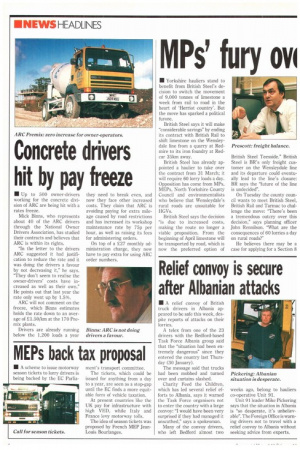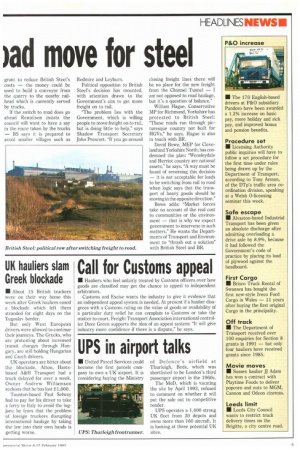MN' fury ovl md move for steel
Page 6

Page 7

If you've noticed an error in this article please click here to report it so we can fix it.
• Yorkshire hauliers stand to benefit from British Steel's decision to switch the movement of 9,000 tonnes of limestone a week from rail to road in the heart of 'Herriot country'. But the move has sparked a political furore.
British Steel says it will make "considerable savings" by ending its contract with British Rail to shift limestone on the Wensleydale line from a quarry at Redmire to its iron foundry at Redcar 35km away.
British Steel has already appointed a haulier to take over the contract from 31 March; it will require 60 lorry loads a day. Opposition has come from MPs, MEPs, North Yorkshire County Council and environmentalists who believe that Wensleydale's rural roads are unsuitable for HGVs.
British Steel says the decision "is due to increased costs, making the route no longer a viable proposition. From the beginning of April limestone will be transported by road, which is now the preferred option of British Steel Teesside." British Steel is BR's only freight customer on the Wensleydale line and its departure could eventually lead to the line's closure: BR says the "future of the line is undecided".
On Tuesday the county council wants to meet British Steel, British Rail and Tarmac to challenge the move: "There's been a tremendous outcry over this decision," says planning officer John Rennilson. "What are the consequences of 60 lorries a day on rural roads?"
He believes there may be a case for applying for a Section 8 grant to reduce British Steel's costs — the money could be used to build a conveyor from the quarry to the nearby railhead which is currently served by trucks.
If the switch to road does go ahead Rennilson insists the council will want to have a say in the route taken by the trucks — BS says it is prepared to avoid smaller villages such as Redmire and Leyburn.
Political opposition to British Steel's decision has mounted, with attention drawn to the Government's aim to get more freight on to rail.
"The problem lies with the Government, which is willing people to move freight on to rail, but is doing little to help," says Shadow Transport Secretary John Prescott. "If you go around closing freight lines there will be no place for the new freight from the Channel Tunnel — I am not opposed to road haulage, but it's a question of balance."
William Hague, Conservative MP for Richmond, Yorkshire has protested to British Steel: "These roads run through picturesque country not built for HGVs," he says. Hague is also in touch with BR.
David Bowe, MEP for Cleveland and Yorkshire North, has condemned the plan: "Wensleydale and Herriot country are national assets," he says. "A way must be found of reversing this decision — it is not acceptable for loads to be switching from rail to road when logic says that the transport of heavy goods should be moving in the opposite direction."
Bowe adds: ''Market forces take no account of the real cost to communities or the environment — that is why we expect government to intervene in such matters." He wants the Departments of Transport and Environment to "thrash out a solution" with British Steel and BR.




































































































